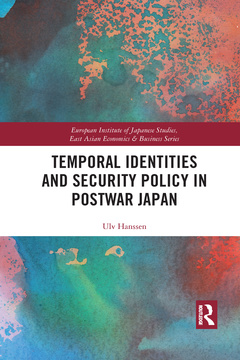Temporal Identities and Security Policy in Postwar Japan European Institute of Japanese Studies East Asian Economics and Business Series
Auteur : Hanssen Ulv

Through a discourse analysis of Japanese parliamentary debates, this book explores how different understandings of Japan?s history have led to sharply divergent security policies in the postwar period, whilst providing an explanation for the much-debated security policy changes under Abe Shinz?.
Analyzing the ways identities can be constructed through ?temporal othering,? as well as ?spatial othering,? this book examines the rise of a new form of identity in Japan since the end of the Cold War, one that is differentiated not from prewar and wartime Japan, but from postwar Japan. The champions of this identity, it argues, see the postwar past as a shameful period, characterized by self-imposed military restrictions, and thus the relentless chipping away of these limitations in recent years is indicative of how dominant this identity has become. Exploring how these military restrictions have shifted from being a symbol of pride to a symbol of shame, this book demonstrates the concrete ways in which the past can both enable and constrain policy.
Temporal Identities and Security Policy in Postwar Japan will be invaluable to students and scholars of Japanese politics and foreign policy, as well as international relations more generally.
1. Introduction and theory 2. Two competing security discourses, 1945–1960 3. Hypothetical enemies, 1960–1970 4. The historic experiment: Refusing to become a great military power, 1970–1980 5. The emergence of the normal nation discourse, 1980–1990 6. Discursive rise and fall, 1990–2000 7. Japan as a responsible member of the international community, 2000–2010 8. Breaking out of the postwar regime, 2010–2019 9. Conclusion
Ulv Hanssen is a lecturer at Soka University, Japan, and an associate research fellow at the Swedish Institute of International Affairs. His research interests include identity in postwar Japan and Japan’s international relations.
Date de parution : 06-2021
15.6x23.4 cm
Date de parution : 06-2019
15.6x23.4 cm
Thème de Temporal Identities and Security Policy in Postwar Japan :
Mots-clés :
Single Member District; Temporal Othering; Japanese politics; Yoshida Doctrine; Postwar Japan; Japanese Security Policy; international security; Neutralist Discourse; international relations; Spatial Othering; foreign policy; Prewar Japan; temporal identities; Japan’s Security Policy; Hypothetical Enemy; JDA Director General; peace state identity; Military Great Power; NATO Member State; Proactive Pacifism; SDF Deployment; Unarmed Neutrality; Collective Self-defense; Gdp Percentage; National Security Strategy; SDF Member; PKO Law; Economic Great Power; Abduction Issue; Yoshida Shigeru; Peace State



